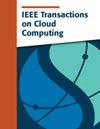Data-Related Parameter Selection for Training Deep Learning Models Predicting Application Performance Degradation in Clouds
IF 5
2区 计算机科学
Q1 COMPUTER SCIENCE, INFORMATION SYSTEMS
引用次数: 0
Abstract
Applications deployed in clouds are susceptible to performance degradation due to diverse underlying causes such as infrastructure faults. To maintain the expected availability of these applications, Machine Learning (ML) models can be used to predict the impending application performance degradations to take preventive measures. However, the prediction accuracy of these ML models, which is a key indicator of their performance, is influenced by several factors, including training data size, data sampling intervals, input window and prediction horizon. To optimize these data-related parameters, in this article, we propose a surrogate-assisted multi-objective optimization algorithm with the objective to maximize prediction model accuracy while minimizing the resources consumed for data collection and storage. We evaluated the proposed algorithm through two use cases focusing on the prediction of Key Performance Indicators (KPIs) for a 5G core network and a web application deployed in two Kubernetes-based cloud testbeds. It is demonstrated that the proposed algorithm can achieve a normalized hypervolume of 99.5% relative to the optimal Pareto front and reduce search time for the optimal solution by 0.6 hours compared to other surrogates and by 3.58 hours compared to using no surrogates.预测云环境下应用程序性能下降的深度学习模型的数据相关参数选择
由于基础设施故障等各种潜在原因,部署在云中的应用程序容易受到性能下降的影响。为了维持这些应用程序的预期可用性,可以使用机器学习(ML)模型来预测即将发生的应用程序性能下降,以采取预防措施。然而,这些机器学习模型的预测精度是其性能的一个关键指标,它受到几个因素的影响,包括训练数据大小、数据采样间隔、输入窗口和预测范围。为了优化这些与数据相关的参数,在本文中,我们提出了一种代理辅助多目标优化算法,其目标是最大化预测模型的准确性,同时最小化数据收集和存储消耗的资源。我们通过两个用例评估了所提出的算法,重点是预测5G核心网和部署在两个基于kubernetes的云测试平台上的web应用程序的关键性能指标(kpi)。结果表明,该算法相对于最优Pareto前沿可实现99.5%的归一化超体积,与其他替代算法相比,可将最优解的搜索时间缩短0.6小时,与不使用替代算法相比,可将搜索时间缩短3.58小时。
本文章由计算机程序翻译,如有差异,请以英文原文为准。
求助全文
约1分钟内获得全文
求助全文
来源期刊

IEEE Transactions on Cloud Computing
Computer Science-Software
CiteScore
9.40
自引率
6.20%
发文量
167
期刊介绍:
The IEEE Transactions on Cloud Computing (TCC) is dedicated to the multidisciplinary field of cloud computing. It is committed to the publication of articles that present innovative research ideas, application results, and case studies in cloud computing, focusing on key technical issues related to theory, algorithms, systems, applications, and performance.
 求助内容:
求助内容: 应助结果提醒方式:
应助结果提醒方式:


